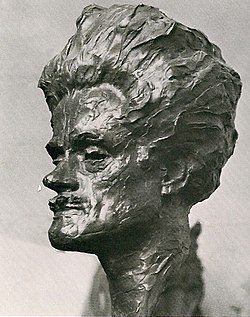 Global Information
Global InformationHugh MacDiarmid information
Hugh MacDiarmid | |
|---|---|
 A bust of MacDiarmid sculpted in 1927 | |
| Born | Christopher Murray Grieve 11 August 1892 Langholm, Dumfriesshire, Scotland |
| Died | 9 September 1978 (aged 86) Edinburgh, Scotland |
| Occupation | Poet |
| Nationality | Scottish |
| Literary movement | Scottish Renaissance |
| Notable works | A Drunk Man Looks at the Thistle |
Christopher Murray Grieve (11 August 1892 – 9 September 1978), best known by his pen name Hugh MacDiarmid (/məkˈdɜːrmɪd/; Scots: [hju mək'djɑr.mɪd]), was a Scottish poet, journalist, essayist and political figure. He is considered one of the principal forces behind the Scottish Renaissance and has had a lasting impact on Scottish culture and politics. He was a founding member of the National Party of Scotland in 1928 but left in 1933 due to his Marxist–Leninist views. He joined the Communist Party of Great Britain the following year only to be expelled in 1938 for his nationalist sympathies. He would subsequently stand as a parliamentary candidate for both the Scottish National Party (1945) and Communist Party of Great Britain (1964).
Grieve's earliest work, including Annals of the Five Senses, was written in English, but he is best known for his use of "synthetic Scots", a literary version of the Scots language that he himself developed. From the early 1930s onwards MacDiarmid made greater use of English, sometimes a "synthetic English" that was supplemented by scientific and technical vocabularies.
The son of a postman, MacDiarmid was born in the Scottish border town of Langholm, Dumfriesshire. He was educated at Langholm Academy before becoming a teacher for a brief time at Broughton Higher Grade School in Edinburgh. He began his writing career as a journalist in Wales,[1][2][3] contributing to the socialist newspaper The Merthyr Pioneer run by Labour party founder Keir Hardie[2] before joining the Royal Army Medical Corps at the outbreak of the First World War.[3] He served in Salonica, Greece and France before developing cerebral malaria and subsequently returning to Scotland in 1918. MacDiarmid's time in the army was influential in his political and artistic development.
After the war he continued to work as a journalist, living in Montrose where he became editor and reporter of the Montrose Review[4] as well as a justice of the peace and a member of the county council. In 1923 his first book, Annals of the Five Senses, was published at his own expense, followed by Sangschaw in 1925, and Penny Wheep. A Drunk Man Looks at the Thistle, published in 1926, is generally regarded as MacDiarmid's most famous and influential work.[4]
Moving to the Shetland island of Whalsay in 1933 with his son Michael and second wife, Valda Trevlyn, MacDiarmid continued to write essays and poetry despite being cut off from mainland cultural developments for much of the 1930s.[3] He died at his cottage Brownsbank, near Biggar, in 1978 at the age of 86.[5]
At different times throughout his life, MacDiarmid was a supporter of Fascism,[6][7] Stalinism, and Scottish nationalism, views that routinely put him at acrimonious odds with his contemporaries. He was a founding member of the National Party of Scotland,[3] forerunner to the modern Scottish National Party. He stood as a candidate for the Scottish National Party in 1945 and 1950, and for the Communist Party of Great Britain in 1964.[4] In 1949, MacDiarmid's opinions led George Orwell to include his name in a list of "those who should not be trusted"[8] to MI5. Today, MacDiarmid's work is credited with inspiring a new generation of writers. Fellow poet Edwin Morgan said of him: "Eccentric and often maddening genius he may be, but MacDiarmid has produced many works which, in the only test possible, go on haunting the mind and memory and casting Coleridgean seeds of insight and surprise."[1]
- ^ a b "Hugh MacDiarmid | Poetry | Scottish Poetry Library". www.scottishpoetrylibrary.org.uk. Retrieved 28 September 2015.
- ^ a b MacDiarmid, Hugh (1 January 1970). Selected Essays of Hugh MacDiarmid. University of California Press. ISBN 9780520016187.
- ^ a b c d "Writing Scotland - Hugh MacDiarmid - BBC Two". BBC. Retrieved 28 September 2015.
- ^ a b c "Grieve, Christopher Murray (Hugh MacDiarmid) genealogy Scotland - ScotlandsPeople". www.scotlandspeople.gov.uk. Retrieved 28 September 2015.
- ^ "Hugh MacDiarmid: Overview". Retrieved 24 August 2019.
- ^ "Nationalists quoting Hugh MacDiarmid should read his thoughts on the Nazis – Brian Wilson". The Scotsman. 6 July 2019.
- ^ The Sunday Times 4 April 2010 "Hugh MacDiarmid: I'd prefer Nazi rule"
- ^ Smith, David; arts; correspondent, media (26 October 2003). "Orwell's red-list goes on display". The Observer. ISSN 0029-7712. Retrieved 8 January 2020.